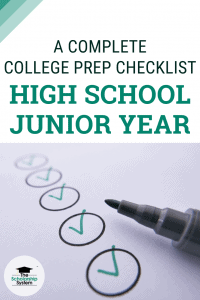
Wow, can you believe it?! Your student’s junior year already marks the halfway point of their high school journey and is a pivotal time. Colleges and universities look closely at their grades, scheduled courses, and activities when making admissions decisions. For both students and parents, it is imperative to stay on top of the whole college admission preparation process both during high school junior year and the following summer.
While there is not any one way to approach the tasks needed to prepare for college, we believe there are certain tasks on college list that, when completed, will put your student on a path for success. Planning and preparation are essential components to accomplishing you and your child’s goals. Let us help you make that ride as smooth as possible! Here is our complete college prep list for high school juniors!
Is your student in high school but not a junior? Click your student’s year for a checklist for them too!
Click here to grab a copy of the checklist




It’s easy to get caught up in all the various college applications and prep but don’t forget to cheer your student throughout the process. They have worked so incredibly hard to get here and deserve TONS of praise for their efforts and hard work!

Starting to prepare for college before the beginning of your junior year is crucial for several reasons. While this article focuses on a college prep timeline for juniors, beginning earlier allows ample time for comprehensive planning and execution.
By the end of sophomore year, students should ideally have identified their academic strengths and weaknesses, explored potential career interests, and started researching colleges. This early start enables them to tailor their junior year courses to align with college admissions requirements and personal goals, such as challenging coursework or specialized extracurricular activities.
Plus, early preparation allows students to build a strong foundation for the college application process. They can start drafting personal statements, gathering letters of recommendation, and even exploring scholarship opportunities.
Beginning before junior year also alleviates the stress associated with last-minute preparations and ensures that students have sufficient time to refine their applications, seek advice from counselors or mentors, and make informed decisions about their future academic and career paths. Overall, starting early sets a proactive tone, enhancing the chances of a successful college admissions journey.
If your student is trying to figure out how to prep for college as a junior, following a structured approach outlined by resources like the College Board junior checklist and our list above is essential. Start by focusing on things to do junior year of high school, including taking challenging courses that align with your academic strengths and interests. This year is crucial for maintaining a strong GPA and preparing for standardized tests like the SAT or ACT.
Also, research colleges that match your academic and personal preferences, exploring factors such as location, size, majors offered, and campus culture. Attend college fairs, virtual tours, and information sessions to gather firsthand insights.
Another vital step is to research financial aid opportunities early on. Understand the types of aid available, such as scholarships, grants, and loans, and explore eligibility criteria and application deadlines. Stay organized throughout this process and use an outlined college timeline for juniors to track application deadlines, test dates, and required documents. By starting early and methodically following these steps, students can confidently navigate the college preparation process and maximize their chances of admission to their preferred institutions.
While it’s wise to plan ahead and research federal student aid during junior year, completing the FAFSA in their junior year is typically unnecessary. The FAFSA is primarily designed for students who are applying for financial aid for the upcoming academic year, which begins after high school graduation for most students.
However, there are exceptions where juniors might need to consider completing the FAFSA earlier. For instance, if a student plans to attend a summer session at a college after completing their senior year of high school, they may need to submit the FAFSA early to meet financial aid deadlines for that summer session. Similarly, students who are graduating from high school early and enrolling in college before their peers may also need to complete the FAFSA earlier than traditional seniors.
In most cases, juniors can wait until their senior year to complete the FAFSA when they have a clearer picture of their college plans and financial aid needs. It’s essential to stay informed about specific college financial aid deadlines and requirements, as these can vary by institution. Students and their families should consult with their school counselors or financial aid offices to determine the appropriate timing for submitting the FAFSA based on their individual circumstances and college plans.
Download a copy of the checklist by clicking the button below:
Click here to grab a copy of the checklist
If you and your child would like to learn more about how to get started with scholarships, sign up for our free college scholarship webinar! It’s a great way to learn about the process and how to identify opportunities that can help your student avoid debt while pursuing their education!